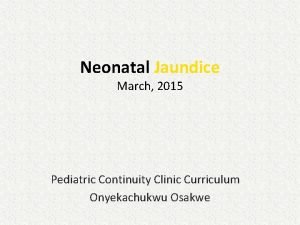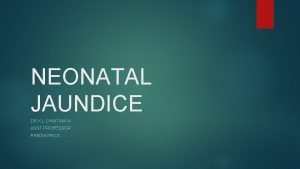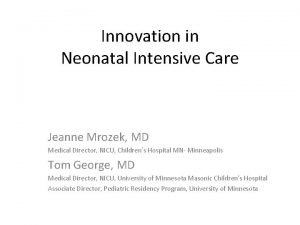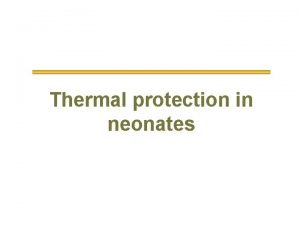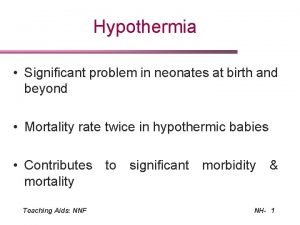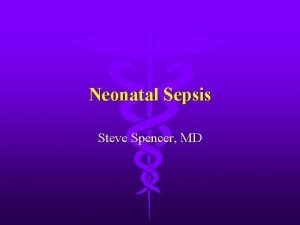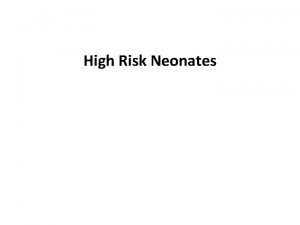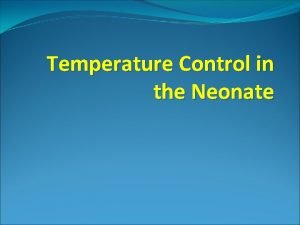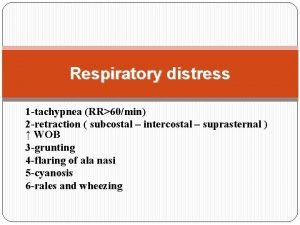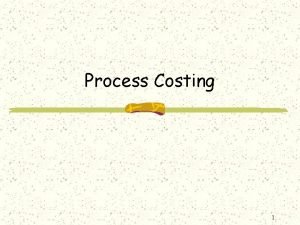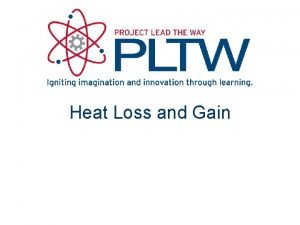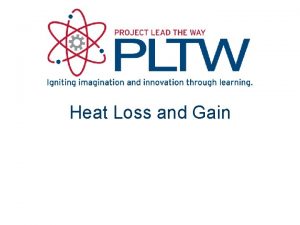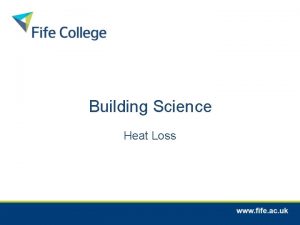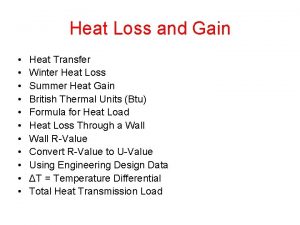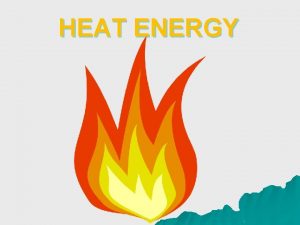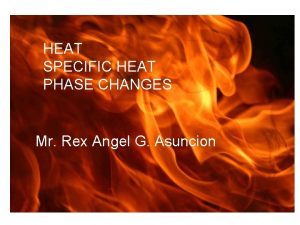Heat Loss in Neonates CAUSES AND PREVENTION Ann











- Slides: 11

Heat Loss in Neonates CAUSES AND PREVENTION Ann Waters: Product Marketing: QED Scientific Ltd.

key physiologic challenges a newborn baby faces directly after delivery: While in utero, heat production by the fetus results in a fetal temperature that is approximately half a degree higher than maternal temperature. ▪ After birth, the newborn infant is exposed to a much different environment. The risk of hypothermia is real and potentially dangerous. ▪ Immediately after birth - heat is transferred from the newborn to the environment. ▪ Loss of heat occurs via: Radiation, Conduction, Convection, and Evaporation.

The Mechanisms of Heat Loss: Radiation, Conduction, Convection and Evaporation

The newborn baby emits heat energy in the form of infrared electromagnetic waves. Conduction: Heat loss or gain via conduction occurs through direct contact with a surface with a different temperature. Such as a cold mattress or scales. Direct transfer of heat occurs from the newborn to this surface. Convection: Heat is transferred by convection when air currents carry heat away from the body surface, i. e. If the infant's body surface is warmer than the surrounding air (as is almost always the case in the delivery room). Evaporation: Evaporation occurs when water is lost from the skin. During evaporation, water is converted from a liquid to a gas, causing approximately 0. 6 kcal of heat to be lost for every 1 g of water lost from the body. Radiation: The loss or gain of this ‘radiant’ energy is proportional to the temperature difference between the skin and the radiating body; heat may be lost from the infant's body to a nearby cold wall or window.

A Newborn Babies Response to Thermal Stress Compared with Adults Thermal regulation is distinctly different in newborns than in adults. ▪ Adults: In adults, the responses to a cold body temperature include peripheral vascular constriction, inhibition of sweating, voluntary muscle movements, involuntary muscle movements (shivering) and nonshivering thermogenesis. ▪ Neonates: Newborns do not exhibit many of these responses and therefore are more susceptible to rapid heat loss. ▪ If not adequately attended to, a newborn infant may experience hypothermia and cold stress. ▪ During evaporation, water is converted from a liquid to a gas, causing approximately 0. 6 kcal of heat to be lost for every 1 g of water lost from the body. ▪ Evaporation is particularly problematic for infants born at 25 weeks gestation age as they lose 15 times more water than term infants due to immature and thinner skin.

Normal Temperature for Neonates ▪ The normal temperature range for a neonate is 36. 5 to 37. 7 °C. ▪ Cold stress may occur when an infant's temperature drops to 36. 0 °C. Temperatures below 36 °C are considered hypothermic. ▪ Moderate hypothermia is considered to be between 32 and 36 °C. Severe hypothermia is considered when the infant's temperature is less 32 °C.

Sources of Heat Loss Preventive Measures Heat Loss Cause: Conduction Heat Loss Cause: Convection Preventions: Warming blanket Room temperature to 26. 6ºC (80ºF) Drapes or blankets Incubator Head covering Heated Mattress Heat Loss Cause: Radiation Heat Loss Cause: Evaporation Preventions: Radiant warmer Heated, humidified inspired gases Wrap neonate + body humidification Warm room Plastic bags / wrap for preterm (<28 -30 weeks)-

Some Heat Loss Prevention Products: Neonatal Warming Blankets, Radiant Warmers, & Incubators. Heated Blankets Baby Heated Blanket – Swaddling Style • • • Temperature: 32°C to 39°C with accuracy of 0. 1°C. Safety: Alarm system. Materials: State of the art Carbon fibre material Xrays penetrable. Voltage: Low input safety voltage Heating Duration: Temperature can reach to 37 °C in within 7 -10 minutes. Blanket Dimensions: 60× 35 cm Warming Duration: Up to 4 hrs Certifications: ISO and CE certificated/Medical Device. Weight: Control unit weighs 1. 6 kg Extras: Alternative sizes can be manufactured and disposable and reusable covers are available. http: //www. qedscientific. com/neonatal-warming-

Radiant Warmers Infant Radiant Warmer - All-in-one versatile design. Designed for optimum convenience, ease of use, and total comfort. The OCW-100 is packed with features yet a very robust design for a long operational life. The warmer comes with individual display temperature readouts. http: //www. qedscientific. com/neonatal-infant-warmer. html Features include: • Warmer device with operational manual and servo modes • Generous bassinet with mult-tilting mechanism and unique side-positioned pillar providing allround access to infant. • No calibration thermistor probe • Multi-positional warmer lamp for easier xrays • Examination lamp for observation • IV pole, instrument tray and drawer for accessories • Unit comes with swivel castors fitted with brakes.

Incubators INC-200 Intensive Care Incubator. Designed to provide a safe and stable environment as possible for critical neonates. Specifically tailored to meet any situation involving critical care for babies. Features Include: • Double Wall Canopy • Servo Humidity Control • Servo Oxygen Control • Inbuilt Weighing Scale • 7" Touch Screen Display • Motorised Tilting & Height Adjustment • Masimo Pulseoximetry http: //www. qedscientific. com/neonatal-intensive-care-incubator. html

QED Scientific is a well-established UK based company supplying an extensive range of medical equipment as well as equipment for pharmaceutical quality control and general laboratories. One of our specialities is in patient warming care. We design and build fluid and blanket warming cabinets in any size and capacity including combined units offering a cost-effective and space-saving solution to patient warming in operating theatres. We often receive requests from hospital staff for custom made fluid warming units such as where a warming cabinet needs to accommodate a certain number of bottles. Our highly experienced staff at QED has decades of expertise in patient warming and is dedicated to meeting the demands of hospital requirements by offering practical solutions. As well as our bespoke service – we also supply actively heated patient warming systems catering for patients of all ages from premature babies to adults. The Med. Warm system is a complete solution to warming patients in the peri-operative setting, pre-, during and post-surgery in recovery/PACU, as well as portable transport warming. The full range consists of scientifically developed neonate swaddling blankets, warming blankets, and mattresses. We also cater for blood transfusion departments supplying a comprehensive range of the latest technologically advanced Ever. Med blood bank refrigerators, platelet incubators and agitators, and plasma freezers. Reagent and pharmacy refrigerators help to complete this medical range. QED Scientific Limited, Unit 21 Botany Business Park Whaley Bridge High Peak SK 23 7 DQ. Telephone: 01663 -735494 QED Scientific also supplies equipment to pharmaceutical and industrial laboratories. The major products in this range include storage refrigerators and freezers, ovens to 500°C, cooled and heated incubators, humidity and climatic chambers. We also supply air filtration products from Air Science – from formalin dispensing and filtered chemical storage cabinets to the full range of fume and particulate filtered cabinets that are widely used in many laboratories. Our maintenance engineers offer full after sales support throughout the UK and in-house technicians provide full technical backup. QED Scientific is accredited to ISO 9001: 2008
 Primary prevention secondary prevention tertiary prevention
Primary prevention secondary prevention tertiary prevention Loss prevention and security in hotels
Loss prevention and security in hotels Pathologic jaundice
Pathologic jaundice Pathological jaundice workup
Pathological jaundice workup Kjs_1999
Kjs_1999 Evaporation heat loss newborn
Evaporation heat loss newborn Thermoneutral environment for neonates
Thermoneutral environment for neonates Normal cbc in neonates
Normal cbc in neonates Definition of high risk neonates
Definition of high risk neonates Warm chain
Warm chain Tachypnea
Tachypnea The method of unit costing is adopted by
The method of unit costing is adopted by


